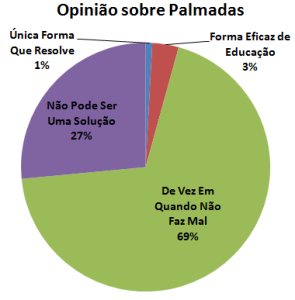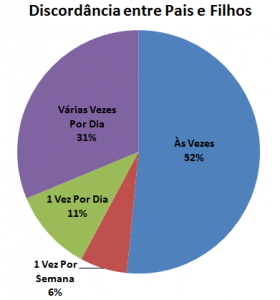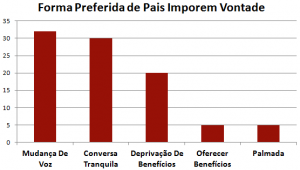In a world where values seem upside down and respect has become a rare thing, an age-old parenting tactic is up for debate and is even strengthened by a law. If there’s one topic that sparks controversy, it’s this: does a spanking teach, or does it harm?
For some, spanking is a correction, a way for a parent to teach and show their child that they are doing something wrong. For others, it’s a prehistoric way of teaching and only ends up modeling violence for the young child in development. The controversy divides opinions entirely, from those who are completely against any kind of physical aggression—whether a slap on the buttocks or a tug on the ear—to those who support “a smack on the bottom” as correction.
We dug deep into this issue and asked parents here at Famivita. Before educational intervention is needed, disagreement must arise. It’s interesting that parents and children either disagree often or rarely. In about 52% of cases, there are hardly any major problems with the kids. On the other hand, 31% say they face problems several times a day with their children. A minority have issues once a week, and another 11% experience some friction with their children once a day. So, how do these parents deal with these situations?
How Should Moms and Dads Act?
Once a disagreement occurs, what can be done to resolve the situation? While the traditional solution—spanking—hasn’t vanished entirely from parental strategies, it’s clear that times have changed. The preferred way to resolve such situations is through non-violent means. The favorite approach is changing the tone of voice. Using a firmer tone signals to the child that something is wrong. A calm, explanatory conversation—with a change in approach if needed—is also one of the most frequently chosen solutions. Dialogue is important to illustrate right and wrong and to give examples. Most of the time, this process is better received by older children. With younger ones, however, there may be comprehension difficulties. Regardless, it at least shows tenderness when correcting a mistake.
The famous “punishment” is no longer common in families with young children. Parents have adopted other ways of teaching. Removing benefits or favorite items—which children are usually very attached to—can help, as it gives the child a good reason to think about what they did “wrong.” Instead of depriving the child of something, parents could even offer something else. However, our respondents were not overly eager about this alternative. For many parents, this means a defeat in education, as they feel they must “buy” the child to get the desired behavior. This can cause other problems later on, as the reward must become ever greater.
Lastly, there is spanking! Although abhorred by many, it is still present in Brazilian families. For these parents, spanking does not mean abuse, but a way of drawing attention used as a last resort. Some psychologists claim that children who are corrected with spanking do not learn the lesson, do not truly understand what they did wrong, and instead become wary of their parents, fearing a repeat situation—which is why they don’t repeat the act. What should be respect turns into fear—is that really the case?
Nowadays, the method for raising children is based on conversation and good dialogue. If that doesn’t yield results, punishment is applied. Children temporarily lose their video games, cell phones, toys, and similar privileges in response to bad behavior, with the aim of helping them see the error of their ways. Some parents use the argument that they were raised with spankings and are very grateful for their upbringing. They wish to pass down the same teaching to their children. Others reflect on their own experiences and choose different parenting methods because they did not accept the way they were corrected and punished as children, claiming it traumatized them.
What Does the Law Say About Spanking?
Another big discussion related to the topic is about the limits of spanking. Is a slap on the buttocks less aggressive than an ear-pulling or a whipping with a belt? Due to a lack of control over these corrective spankings—and seeing the high number of children being physically harmed every day—a bill was created to protect and prohibit educational spanking and any other kind of physical correction or cruel treatment.
Law 13010/14 of the Statute of Children and Adolescents, recently approved by the senate, aims to punish parents or guardians who use physical force to educate their children, requiring them to receive a warning, undergo orientation courses, and receive psychological counseling. Many senators opposed the law, believing parents would be left vulnerable to false accusations, paying for unfounded mistakes.
The debate extends to the public, dividing existing opinions and beliefs. Questions about 
Child behavior specialists state that talking and explaining the mistake is much more valid than a slap or a spanking. Psychologist Super Nanny recommends the “timeout corner” method, where the child is placed in a reserved spot to think about what they did wrong. Not all parents see benefits in this method, believing the child only gets even more upset during the time set aside for reflection.
The bill was approved on June 4, 2014, by the senate and is currently awaiting the president’s signature before being enacted, but there’s already a lot of discussion about rights and penalties. Many continue to fight and anxiously await the enforcement of the law, while many others remain outraged and frustrated by a law that completely removes the rights and powers of parents to educate their children.
See also: Child Abuse – Destroying Dreams
Photos: TF Personal Archive













